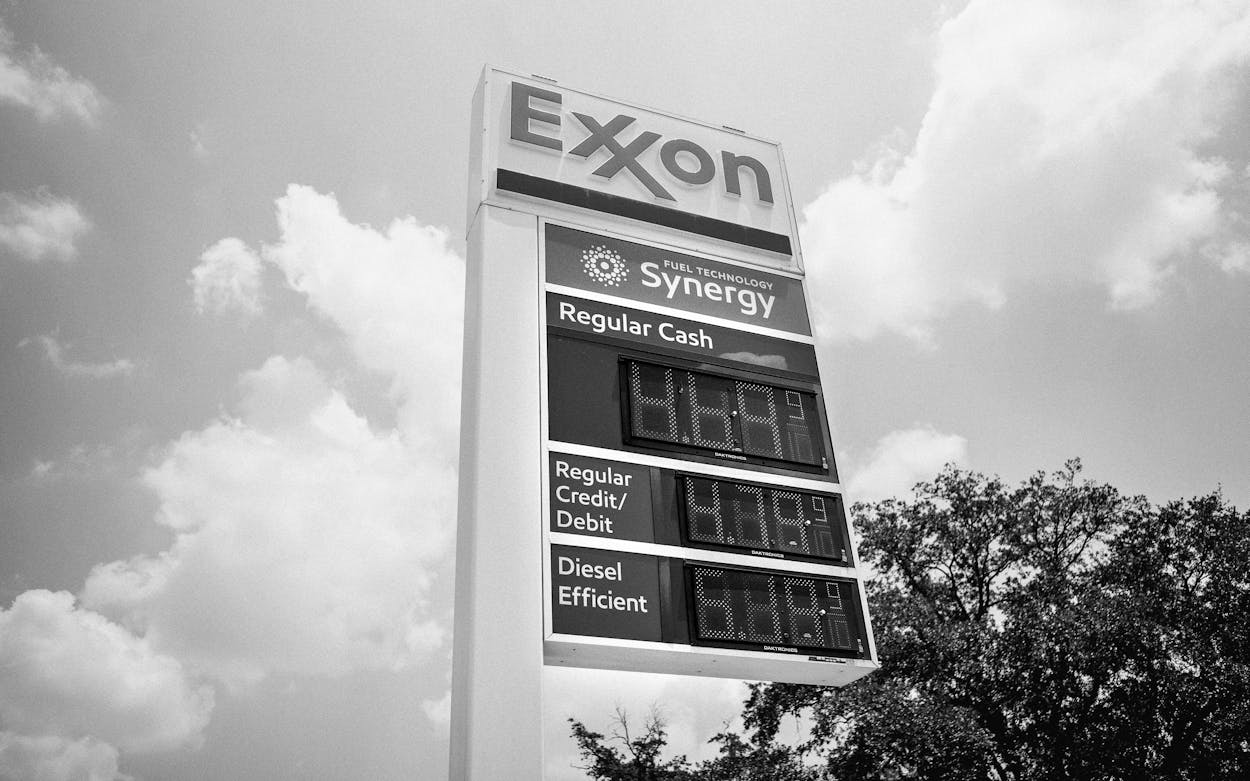ExxonMobil, the globe-straddling fossil-fuel colossus, reported record-setting profits this week. By record-setting, we mean no Texas company has ever reported a bigger quarterly profit from its business operations. We didn’t adjust for inflation, but even if we had, it would rank in the top three.
If there was any whooping and fist-pumping within the executive suite—a.k.a. the God Pod—at Exxon’s headquarters in Irving, that wasn’t evident when CEO Darren Woods spoke to investors. He called the results merely “very strong,” which is kind of like calling the Mississippi River “very large” or Texas politics “very conservative.” Technically true, but it fails to capture the immensity.
Thanks to soaring oil prices and enormous refining margins, Exxon raked in $17.9 billion in profits and $115.7 billion in revenue for the three months between the end of March and the end of June. To wrap your mind around such absurd figures, imagine pulling into an Exxon gas station and filling up your tank. In the time that takes, Exxon would have taken in more than $1 million. Or imagine binging every episode of the show Dallas. By the time you’re through season six, Exxon would have earned $1.1 billion. And you would still have eight seasons of J.R. Ewing and company left to go.
Exxon’s impressive feat comes after a few very bad years. In 2020, it posted losses every quarter and was booted from the Dow Jones Industrial Average, a prestigious spot it had held since 1928, to make room for more tech stocks. It cut its workforce, including 1,900 U.S. workers, as part of a belt-tightening when oil and gas prices were low at the beginning of the pandemic. A year later, in 2021, a small hedge fund sharply criticized Exxon’s management, claiming the company’s plan for maneuvering through the energy industry’s transition to lower-carbon-emission fuels was flawed—and those critics won three seats on its board.
So does the second quarter’s massive haul mean Exxon has rebounded? Sure, for now. The fossil-fuel business is cyclical. Good years are followed by bad. This year, the spiking oil and gas prices—stemming largely from concerns about rising risks that there wouldn’t be enough available crude following Russia’s invasion of Ukraine—have fed the surging profits. (These concerns have abated in recent weeks, but Exxon’s quarter ended in June.)
But high prices tend to temper themselves, and Americans are already cutting back on their energy intake. Not to mention, Exxon’s past failures to prepare for energy’s greener future will continue to plague it and could yet cost it dearly.
The good news for Texas in Exxon’s big numbers comes from the company’s increasing its oil and gas output in the Permian Basin and dialing up refining operations near Houston. As a result, state coffers are reaping record oil and gas taxes—more than $1 billion a month right now.
But the bad news is that these record profits could well lead Exxon to redouble its focus on fossil fuels, dashing any hope that the Big Unit, as the company was once known, could become a global leader in offshore wind or hydrogen power—or seek ways to capture carbon dioxide emissions and lock them safely away.
The pursuit of near-term profits could end up damaging the state’s long-term economy. After all, what would Houston be if the world moved away from fossil fuels, leaving Exxon behind? That part of the state could be left with many unemployed oil and gas workers—along with the environmental damage and harm to human health that’s been wrought upon an area sometimes referred to as the “carcinogenic coast.”
However you choose to view it, the news of Exxon’s remarkable quarter has already drawn plenty of attention. Climate activists have expressed concerns. California governor Gavin Newsom tweeted that while Exxon makes massive profits, the company is “causing the deaths of countless Americans, from extreme heat, drought, fires and choked lungs. Their corporate greed is literally killing us.”
Expect the profits to put Exxon even more squarely in the crosshairs of politicians. As gasoline prices surged to over $5 a gallon earlier this year, President Joe Biden said “Exxon made more money than God this year.” And this was before the most recent celestial profits. Exxon is back, baby—except its future doesn’t look much brighter than it did yesterday.








